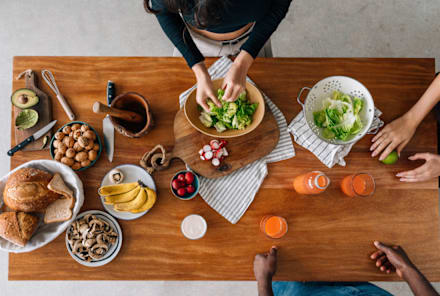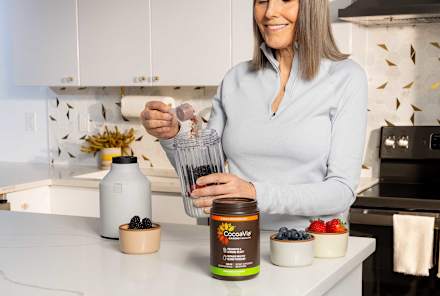Advertisement
I Chewed Each Bite Of Food 30 Times. Here's How It Changed My Digestion

Like many hardworking professionals in demanding, deadline-driven careers, I don't have a lot of downtime.
So eating lunch at my desk while staring at a computer screen (or while calling to book a doctor's appointment, or while in the car on my way to said appointment) has become the norm. After all, I reason to myself, if you're not multitasking, aren't you just being lazy?
But lately I've noticed that the less time I have to just sit and be, the worse my digestion has become.
I never used to be that person who experienced bloating or alternating bouts of constipation and diarrhea, but here I am! And I've found it all somewhat surprising since I eat a pretty healthy paleo-ish, whole-foods-based diet.
So this got me thinking: Could my issues be more about how I'm eating than what I'm eating?
Could the simple act of chewing be the key to good digestion?
While we may not put much emphasis on chewing in our fast-paced Western culture, others believe it's a cornerstone of good health. Consider ayurveda—the 7,000-year-old school of medicine considers slow and thorough chewing essential for strong digestive health. Some accounts say ayurveda calls for chewing each bite of food a minimum of 30 times, or until it's liquefied, in order to help you distill more nutrients from your food and keep your digestive process running smoothly.
Me, on the other hand? If I really think about it, I typically chew each bite of food only enough times for me to not choke on it. Probably five to 10 chews max. So I'll admit, this whole "chewing until liquefaction" thing initially sounded downright excessive. But some modern-day nutrition experts make pretty compelling arguments for upping your mastication game.
Turns out, there are digestive enzymes in your saliva, and "when you don't chew your food until liquid, you're skipping an important part of your digestive process," says Robyn Youkilis, a leading expert in digestive health and author of Go With Your Gut who offers a free 21-day chewing challenge. "I'm always reminding my community 'Your stomach doesn't have teeth!'"
Lack of adequate chewing, in turn, can lead to belly issues such as bloating, constipation, and even acid reflux, says Youkilis, and "because the rest of your digestive system is having to do more work, you may feel that dreaded post-meal food coma when you don't take the time to chew."
Plus, there's the whole mindfulness component. Chewing your food at least 30 times literally forces you to slow down. "The practice of chewing is what took the idea of 'mindful eating' and brought it down into reality for me," says Youkilis. "Rather than saying I'm not going to be scrolling my phone while I eat, I can instead focus on what I am going to do, which is chew each bite completely."
But beyond improving digestion and being more present, chewing more could make a whole lot of sense for controlling your weight, too. According to one study1, obese people tend to chew their food less than people who are leaner. But when researchers asked both obese and lean participants to chew each bite of food 40 times, both groups ate less and helped regulate their hunger and satiety hormones.
Other research has found that chewing your food until no lumps remain helps your body burn slightly more calories—about 10 more calories per 300-calorie meal.
What happened when I chewed every bite 30+ times
Given the numerous potential perks, I decided I couldn't afford not to chew my food more. Honestly, I didn't care much about the measly increased calorie burn, but I did care a whole lot about the improved digestion and mindfulness. My one big problem: How do I chew more when I have basically zero free time?
When I asked Youkilis for her advice, she joked that I should "chew faster" but also said that if I could only mindfully eat for a few minutes at the beginning of my meal, that's a great place to start.
Alternatively, I could begin with a goal of 15 to 20 chews per mouthful and gradually increase over time. But, she emphasizes, "you don't need to count, just make sure the food turns to liquid before you swallow."
So that's what I did. For a week straight, I dutifully chewed and chewed and chewed until no lumps remained. Yes, it was initially a big pain in the ass—and I ended up cursing my fully loaded salads—but over time I got the hang of things. And to be honest, it really didn't add that much time to my meals.
While I did remove myself from my computer to focus more on my meals while I ate, I didn't fully give up multitasking. I decided to use this time to strategically let my mind wander—because, typically, that's when my most creative ideas pop up. During those moments I really had no time? To be honest, sometimes I just made a smoothie.
At the one-week mark, I'd mostly gotten the hang of chewing each bite of food approximately 30 times (sometimes a little more, sometimes a little less), with a few slip-ups sprinkled in. The results? Nothing crazy life-changing, but I was a bit less gassy and a bit more regular and less, well, urgent than usual.
I also didn't feel the need to mindlessly munch quite as much (since it was no longer a mindless activity), and my days felt surprisingly more productive when I gave my brain a bit of a break.
The takeaway
While I'm not sure that I'll continue to chew each bite of food 30 times (counting sucks the joy out of eating for me), the results were substantial enough to prove that chewing is an essential component of digestion—not just a necessary step to funnel food down the gullet.
So, yes, I plan to do my best to chew each bite of food completely. And when I feel like I can't? There are always smoothies and digestive enzymes.
Watch Next
Enjoy some of our favorite clips from classes
Enjoy some of our favorite clips from classes
What Is Meditation?
Mindfulness/Spirituality | Light Watkins
Box Breathing
Mindfulness/Spirituality | Gwen Dittmar
What Breathwork Can Address
Mindfulness/Spirituality | Gwen Dittmar
The 8 Limbs of Yoga - What is Asana?
Yoga | Caley Alyssa
Two Standing Postures to Open Up Tight Hips
Yoga | Caley Alyssa
How Plants Can Optimize Athletic Performance
Nutrition | Rich Roll
What to Eat Before a Workout
Nutrition | Rich Roll
How Ayurveda Helps Us Navigate Modern Life
Nutrition | Sahara Rose
Messages About Love & Relationships
Love & Relationships | Esther Perel
Love Languages
Love & Relationships | Esther Perel



















